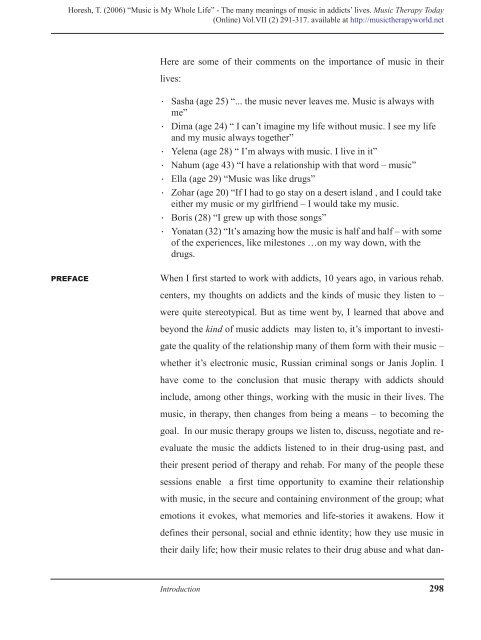Music is My Whole Life - World Federation of Music Therapy
Music is My Whole Life - World Federation of Music Therapy
Music is My Whole Life - World Federation of Music Therapy
You also want an ePaper? Increase the reach of your titles
YUMPU automatically turns print PDFs into web optimized ePapers that Google loves.
Horesh, T. (2006) “<strong>Music</strong> <strong>is</strong> <strong>My</strong> <strong>Whole</strong> <strong>Life</strong>” - The many meanings <strong>of</strong> music in addicts’ lives. <strong>Music</strong> <strong>Therapy</strong> Today<br />
(Online) Vol.VII (2) 291-317. available at http://musictherapyworld.net<br />
PREFACE<br />
Here are some <strong>of</strong> their comments on the importance <strong>of</strong> music in their<br />
lives:<br />
•<br />
•<br />
•<br />
•<br />
•<br />
•<br />
•<br />
•<br />
Sasha (age 25) “... the music never leaves me. <strong>Music</strong> <strong>is</strong> always with<br />
me”<br />
Dima (age 24) “ I can’t imagine my life without music. I see my life<br />
and my music always together”<br />
Yelena (age 28) “ I’m always with music. I live in it”<br />
Nahum (age 43) “I have a relationship with that word – music”<br />
Ella (age 29) “<strong>Music</strong> was like drugs”<br />
Zohar (age 20) “If I had to go stay on a desert <strong>is</strong>land , and I could take<br />
either my music or my girlfriend – I would take my music.<br />
Bor<strong>is</strong> (28) “I grew up with those songs”<br />
Yonatan (32) “It’s amazing how the music <strong>is</strong> half and half – with some<br />
<strong>of</strong> the experiences, like milestones …on my way down, with the<br />
drugs.<br />
When I first started to work with addicts, 10 years ago, in various rehab.<br />
centers, my thoughts on addicts and the kinds <strong>of</strong> music they l<strong>is</strong>ten to –<br />
were quite stereotypical. But as time went by, I learned that above and<br />
beyond the kind <strong>of</strong> music addicts may l<strong>is</strong>ten to, it’s important to investi-<br />
gate the quality <strong>of</strong> the relationship many <strong>of</strong> them form with their music –<br />
whether it’s electronic music, Russian criminal songs or Jan<strong>is</strong> Joplin. I<br />
have come to the conclusion that music therapy with addicts should<br />
include, among other things, working with the music in their lives. The<br />
music, in therapy, then changes from being a means – to becoming the<br />
goal. In our music therapy groups we l<strong>is</strong>ten to, d<strong>is</strong>cuss, negotiate and re-<br />
evaluate the music the addicts l<strong>is</strong>tened to in their drug-using past, and<br />
their present period <strong>of</strong> therapy and rehab. For many <strong>of</strong> the people these<br />
sessions enable a first time opportunity to examine their relationship<br />
with music, in the secure and containing environment <strong>of</strong> the group; what<br />
emotions it evokes, what memories and life-stories it awakens. How it<br />
defines their personal, social and ethnic identity; how they use music in<br />
their daily life; how their music relates to their drug abuse and what dan-<br />
Introduction<br />
298
















